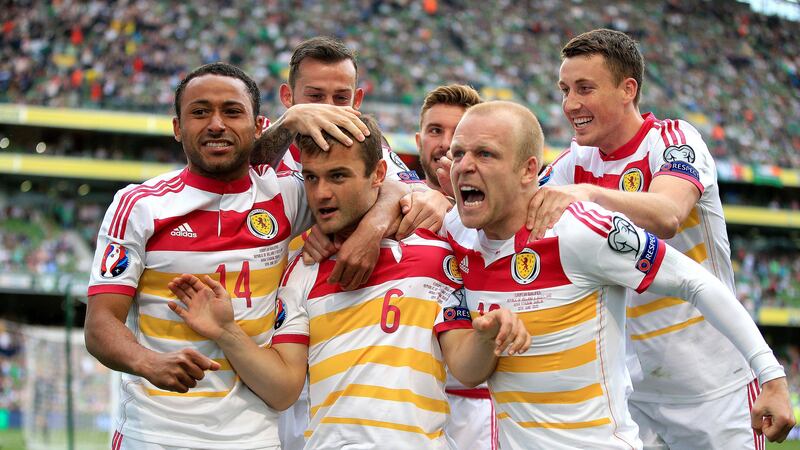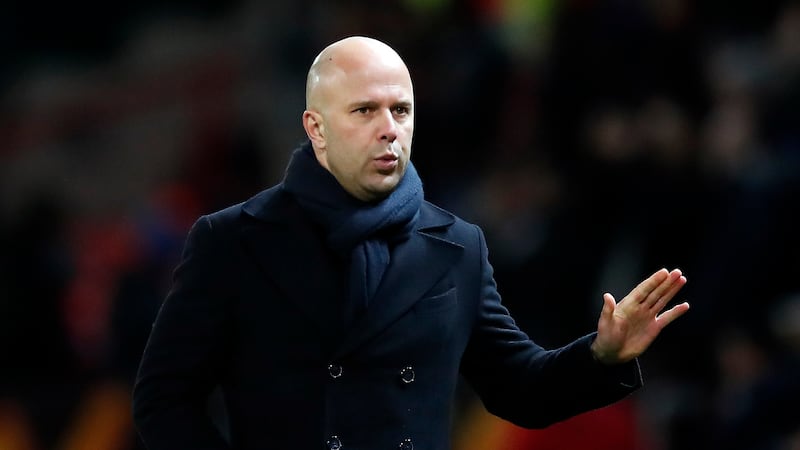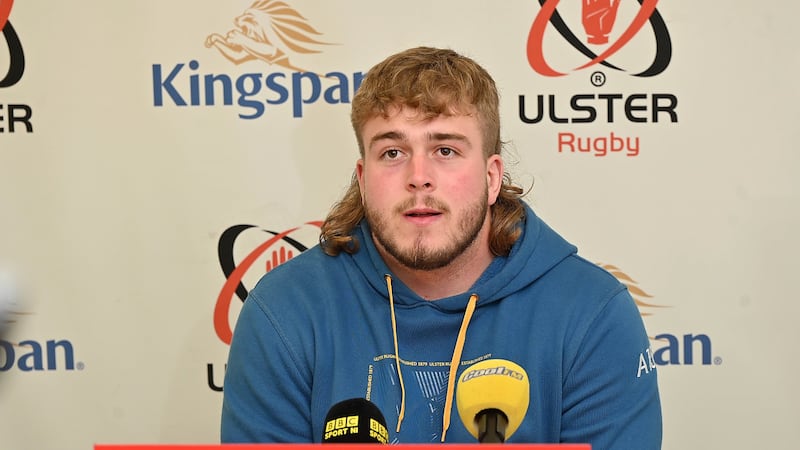2016 European Championship qualifying Group D:
Republic of Ireland 1 Scotland 1
STANDING in the tight confines of a corridor on the ground floor of the Aviva Stadium on Saturday night, Martin O’Neill was trying to look on the bright side of life and the infinite possibilities of Group D.
But he was convincing nobody. The scrappy 1-1 draw with Scotland in the capital felt like a morale-sapping defeat.
The way the Scottish players celebrated at the final whistle and the way the Irish players trudged off the field certainly looked and felt like the end of the Euro 2016 road for the deflated home side.
Going through the seemingly endless permutations of Group D, with four rounds of games still to play, felt like wasted energy. Mathematically, the Republic are still in the running – but they would probably need to beat world champions Germany in October and hope the Scots drop points somewhere along the way. It is possible Gordon Strachan’s side will come unstuck in September/October time - particularly against the Germans or Poland - for they were a pale shadow of the side that beat the Irish in Glasgow last November.
The big imponderable is backing an Irish team that is desperately short on quality and confidence to beat the Germans and possibly Poland three days later. O'Neill and the rest of the Irish camp seemed to be clutching at straws. Everything points to Germany, Poland and Scotland finishing ahead of them in Group D.
After a bright opening to Saturday’s crucial qualifier in Dublin, the Irish forged ahead in the 38th minute through Jonathan Walters’ goal that was clearly offside. The Stoke City striker pounced from a yard out after Daryl Murphy – a surprise starter for the Republic – saw his glancing header from a Robbie Brady corner blocked by 'keeper David Marshall.
But just two minutes into the second half, Shaun Maloney’s heavily deflected shot off the back of John O'Shea nestled into the Irish net. Badly stunned, the home side regrouped but huffed and puffed for the remainder of the tie without looking like breaking down the Scots again.
Arguably the biggest talking point of the game from an Irish perspective was O’Neill’s bizarre decision to substitute the one cerebral element in his side – Wes Hoolahan – in the 73rd minute. The Norwich City playmaker was unquestionably Ireland’s most dangerous attacker. The home side created one meaningful chance from open play and Hoolahan was the architect.
With the game poised at 1-1 after 49 minutes, the 33-year-old skipped past Scott Brown and slipped the ball to Murphy in the inside left channel but the Ipswich striker’s effort was expertly blocked by Marshall. Hoolahan was Ireland’s one ray of sunshine on Saturday night before O’Neill shut out the light by withdrawing him.
Afterwards, the Republic manager explained his controversial decision: “What was happening, as we were eventually getting some pressure, we thought we might have to go a bit longer in those last dying moments of the game because our team was getting tired. And Robbie Keane [Hoolahan’s replacement] is our best goal-scorer and has been for years.”
It was put to O’Neill that Hoolahan’s withdrawal meant the team was devoid of any creativity.
O'Neill replied: “You’ll always [lose creativity]. That may happen in the game, but if you decide the pressure you’re going to exert is going into the penalty area then Robbie Keane might have been the one to score.”
Similar to his thoughts on the remainder of this stuttering qualifying campaign, O’Neill’s reasoning for substituting his best player was wholly unconvincing.
Of course, Ireland’s hopes of making a few more chances weren’t helped after Aiden McGeady failed a fitness test for Saturday night’s Celtic showdown. Apart from the wistful play of Hoolahan, Ireland’s attacking approach was bordering on prehistoric. Nobody in green was capable of taking the game by the scruff of the neck.
Hopes, inevitably, were pinned on James McCarthy to rise to the challenge, but he isn’t close to being the totemic midfielder he’s been hyped up to be. Twenty-seven games into his international career it’s abundantly clear the Everton midfielder isn’t leadership material and lacks the skills set to run games.
It was another typical James McCarthy performance: full of running and endeavour but the game slipped from his tenuous grasp soon after the restart.
The Scottish midfield wasn’t much better. Arguably the pick of the bunch was West Brom’s James Morrison, who at least showed composure in possession.
Indeed, this was a clash between two unmistakably average international teams. Nobody on either side lacked courage when it came to making a tackle, but the kind of courage that wins big games was in short supply.
O’Neill bemoaned the lack of shots on Scotland's goal: “Our training sessions revolve around trying to get players into positions to score a few goals – have shots at goal… If you have a half decent shot you might as well use it. I believe some attacking midfielders should be thinking of not coming off that field without at least having three or four shots in a game.”
Predictably, the home side played in straight lines, trying to barge their way into Scottish territory with little success. Robbie Brady’s free-kicks and corners appeared Ireland’s most dangerous weapon.
“If we do not have phenomenal creativity in the side,” O’Neill said, “then we have to utilise every aspect of the game to try and get something out of it.”
O’Neill was probably guilty of exaggerating Ireland’s “total dominance” in a first half of few chances.
“I thought we were very strong in the first half,” he said.
“Scotland didn’t come to terms with our system of play, they [the Scottish bench] were balling out instructions and I thought we were in control. We had the one goal to show for it; I was hoping we might’ve added a second, but it didn’t materialise.
“What we should have done was start brightly in the second half and don’t concede – at least in the opening quarter – unless somebody produces something magical and you just hold your hands up. But the goal we conceded was poor from the view of not closing players down and the execution of the [Maloney’s] shot is going miles wide and it hits John’s back and goes in. That certainly knocked us back for a while.”
O’Neill insisted that there would be more twists and turns in Group D and that it wasn’t just “fighting bravado” on his behalf in the immediate aftermath of a disappointing result and performance. The Irish have handy back-to-back September games against Gibraltar (away) and Georgia (home), while Scotland, two points better off than O’Neill’s side, face Georgia (away) and Germany (home).
“We have to try and become more creative. We need midfield players trying to get goals. We don’t score a lot of goals. Unfortunately, it’s there in black and white – but we have to try and try and try and improve our chance ratio, not just a final 15-minute burst at the end where you’re throwing absolutely everything into the area.
“We need to be a bit more creative, although I thought in periods we kept it, but what a lift they got after half-time with a goal that they haven’t really worked for.”
In the mixed zone on Saturday night, Robbie Keane – who turns 35 next month – insisted: “There’s no way we’re out of this, not a chance. Scotland have tough games coming up, so it’s vital in our next two games we get the six points.”
Despite suffering the double bereavement of cousins – Steve and Alan Harris, both of whom perished in an industrial accident in Portmarnock on the eve of the game – Keane insisted he was “mentally ready” for Saturday’s clash but was physically short of match practice.
“Physically, I wasn’t ready because I haven’t played much for two months,” said the LA Galaxy striker.
“I played 90 minutes last week – I shouldn’t have played 90, I should only have played 60.
“I was mentally ready for the game but coming on for 20 minutes, it was hard to get into the game. But I thought we deserved to win the game.”
Before leaving reporters, O’Neill sounded a defiant note: “I still think we’re capable of winning our matches and making the Germany game pretty dramatic.”
After Saturday’s performance, it’s hard to share the manager’s optimism…
Rep of Ireland: Given, Coleman, O'Shea, Wilson, Brady, Hendrick, Whelan (McClean 68), McCarthy, Hoolahan (Keane 73), Walters, Murphy (Long 80); Subs Not Used: Forde, Keogh, McGeady, Meyler, Christie, Ward, Quinn, McGoldrick, Westwood; Booked: Whelan, McCarthy, McClean; Goals: Walters 39.
Scotland: Marshall, Hutton, Martin, Mulgrew, Forsyth, Ritchie (Anya 45), Brown (McArthur 85), Morrison, Naismith (Berra 90), Maloney, Steven Fletcher; Subs Not Used: Gordon, Whittaker, Darren Fletcher, Adam, Greer, Robertson, Forrest, Griffiths, Samson; Booked: Naismith; Goals: O'Shea 46 og.
Ref: N Rizzoli (Italy).








